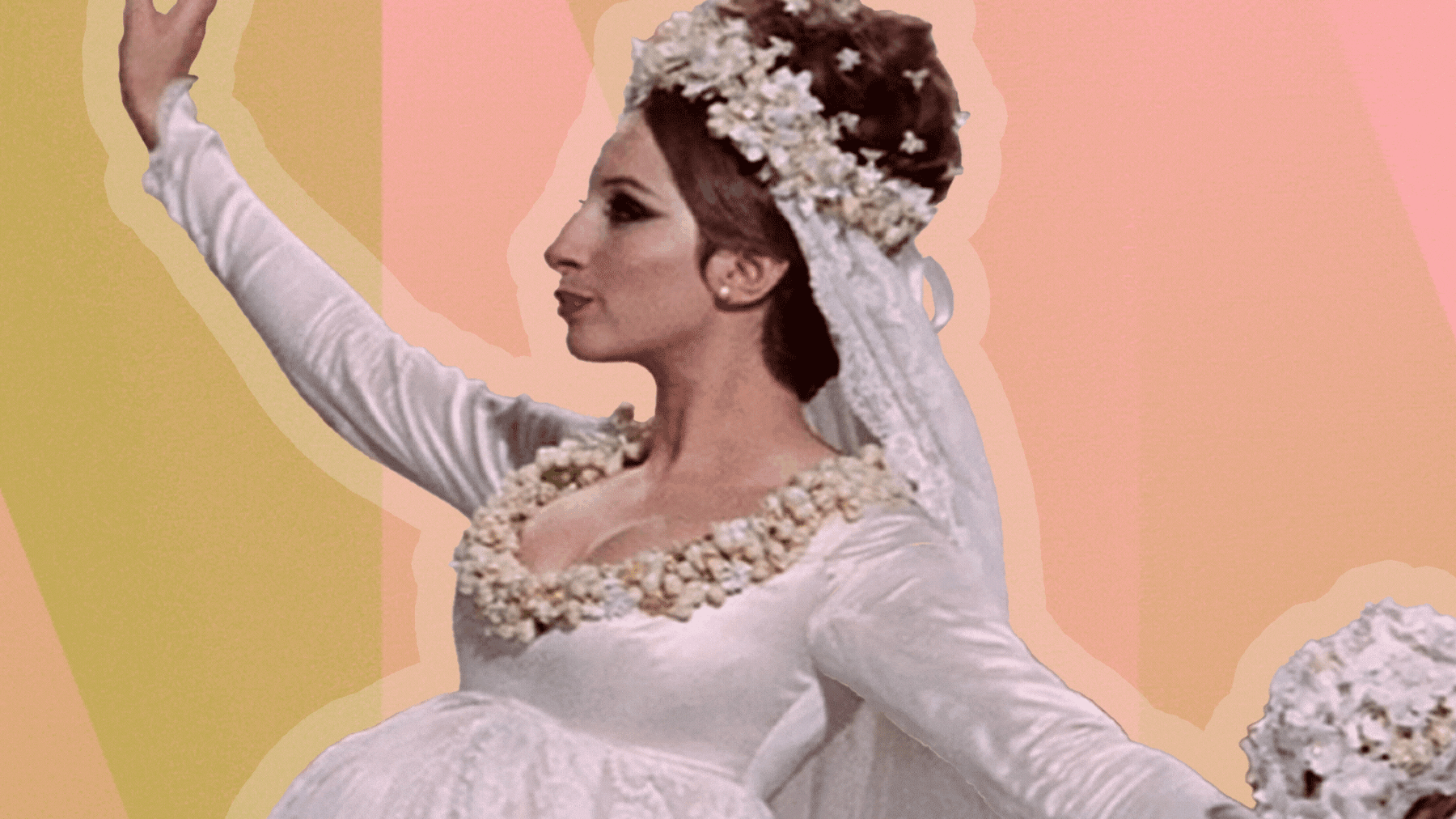I played Fanny Brice on Broadway. Here’s what she taught me about being an actor
When Beanie Feldstein departed the Broadway revival of ‘Funny Girl’ early, an understudy got an unexpected moment in the spotlight

When Julie Benko signed on as an understudy in Funny Girl, she found herself living a version of Fanny Brice’s rise to stardom. Photo by Angelie Zaslavsky
I was about to take the stage as Fanny Brice for the first time, and I had the shpilkes.
A few family members and friends were there to cheer me on for the big debut, but the theater’s 1,275 seats were mostly filled with strangers. From posts on theater message boards and social media, I knew that some had bought tickets in a spirit of schadenfreude, intrigued by the prospect of an unknown understudy attempting to follow in Barbra Streisand’s incomparable footsteps. Many other patrons discovered upon arrival, to their horror, that they had missed the ticket advisory alerting them that the regular star, Beanie Feldstein, had planned to be out of the show that whole weekend.
Whether they were there by mistake or on purpose, it’s safe to say that nobody knew what to expect from that performance of Funny Girl — least of all me. Even after 14 years as a professional understudy, during which I developed a system of color-coded charts and binders to keep meticulous track of up to eight roles in a single show, I felt unprepared for a task of this magnitude. I’d had exactly one full rehearsal on the stage with the regular cast, which had taken place earlier that day. I’d mostly practiced outside rehearsal hours, begging whomever I could find — castmate, husband, sister, cat — to read lines with me, then pushing all my living room furniture aside to run the show on the grand stage of my one-bedroom apartment. Since some of my costumes didn’t arrive until an hour before showtime, I never even had the chance to run through all of Fanny’s offstage quick-changes.
Was I putting too much pressure on that first night? Perhaps. But this opportunity felt like a culmination of the long, hard slog that is life as an unknown actor. The constant rejection. The survival jobs. The early wake-ups for open-call auditions, during which I’d dutifully sing my 16 bars for casting interns even though their bosses had likely already found someone famous for the role. The directors and agents who said that while I’d make a good understudy, they needed someone prettier for the actual role; or told me that I could play an ingenue if I dropped 10 pounds; or, my personal favorite, asked if I could make my face “less round.”
During the overture, I stood behind the red curtain in a daze. “It’s OK to mess up,” I reassured myself weakly. “Just take it one moment at a time.” The trumpet defiantly blared its final notes — Nicky Arnstein! Nicky Arnstein! — as the lights faded to black. I took a breath.
For a moment, as the bright spotlight fell on my face, everything was still. Then — entrance applause! Emboldened, I stepped downstage and waited for the music to recede before uttering the singular line everyone was waiting for.
“Hello, gorgeous.”
While most of that evening is a blur to me now, I remember a palpable shift in the crowd’s energy after my first big number, “The Greatest Star.” As I belted out Fanny’s self-confident assertions of her own talent, I could suddenly feel the audience believing in mine. Art was reflecting life, just as it had for Streisand herself, who originated the role of Fanny as a relatively unknown actress. I took my bow exhausted, relieved, and walking on air. I didn’t think life could get any better than that first night as Fanny.
That is, until my last.
By then, 17 months had passed. I had played the role almost 200 times, including an unexpected monthlong stint in which I took over full-time between Beanie Feldstein’s departure and Lea Michele’s debut. (My husband has since framed the poster, with my name above the title, for posterity.) I’d had many great audiences, plus a few duds. Once, I blanked on my lyrics in “Don’t Rain on My Parade,” taking what was essentially a very panicked scat solo for a whole phrase. On the day I ran the Central Park Pride Race, the stage manager called to say that Lea was sick; after picking up my rainbow bagel (the proverbial plate of onion rolls was, alas, missing) at the finish line, I rushed to the theater for a surprise two-show day. I’d even performed partially deaf after a routine nasal rinse went wrong. Over time, I’d learned how to relax and experiment in front of an audience, as well as how to power through the astonishing level of vocal, physical, and emotional exhaustion that came from playing such a mammoth role eight times a week.
Yet I quickly discovered that my journey with Fanny didn’t just belong to me. This story of a Jewish woman succeeding in a non-Jewish world has inspired generations. One such Funny Girl devotee — a young actress and singer herself — waited at the stage door one night to proudly show me a tattoo on her arm drawn in the shape of Streisand’s nose. “That’s my ‘American Beauty’ Jewish nose too,” she declared, quoting Fanny’s assessment of her own looks.
Then there’s the musical’s transcendent score, composed by Jule Styne, which has the power to reach people in emotional moments unrelated to Fanny’s rise to stardom. Early on, a teenager messaged me on Instagram that she had grown up listening to her mother singing “People” around the house. Her whole family had planned to see Funny Girl on her 18th birthday, but her mother passed away just a few months before our revival opened. “Hearing you sing ‘People’ was so healing for me and made me feel like my mom is with me,” she wrote.
I also found myself representing the dreams of theater kids and understudies everywhere. Young actors found me on social media or New York City street corners and told me that my unexpected trajectory had emboldened them to embrace their own passions. Older theater professionals, disillusioned after years in this oft-unforgiving business, confided that they’d come to believe in the power of theater again.
Those were the people who filled the 1,275 seats on my last night as Fanny. For that final show, I wasn’t nervous at all. I stood upstage of the curtain hugging the cast and crew. As the overture ended and the trumpet sounded its familiar blare — Nicky Arnstein! Nicky Arnstein! — everyone rushed to their offstage positions, leaving me upstage center in the darkness. I took a deep breath and waited for the customary moment of silence.
Instead, I heard a roar. As the spotlight came up and I peered into the shadowy auditorium, I noticed something different than usual. It took a minute for me to understand that the audience was standing and screaming — for me.
“Remember this,” I instructed myself. Tears streamed down my face, and I waited for the music to abate so I could say that iconic line one final time.
But I couldn’t hear any music. Not over the enormous din of the crowd. They hooted and hollered, taking their time to celebrate, the sound of applause reverberating off the walls with such force that I briefly wondered if the ceiling might cave in. A lump formed in my throat. For once, I wasn’t worried about what that might do to my singing voice. I just listened, received and celebrated with them.
Finally, the audience took their seats. I held my breath for a moment, wanting to savor the words. I didn’t so much say them as let them spill out of me — half-laugh and half-wail, simultaneously an invocation, an acknowledgement and a farewell.
“Hello, gorgeous.”
















